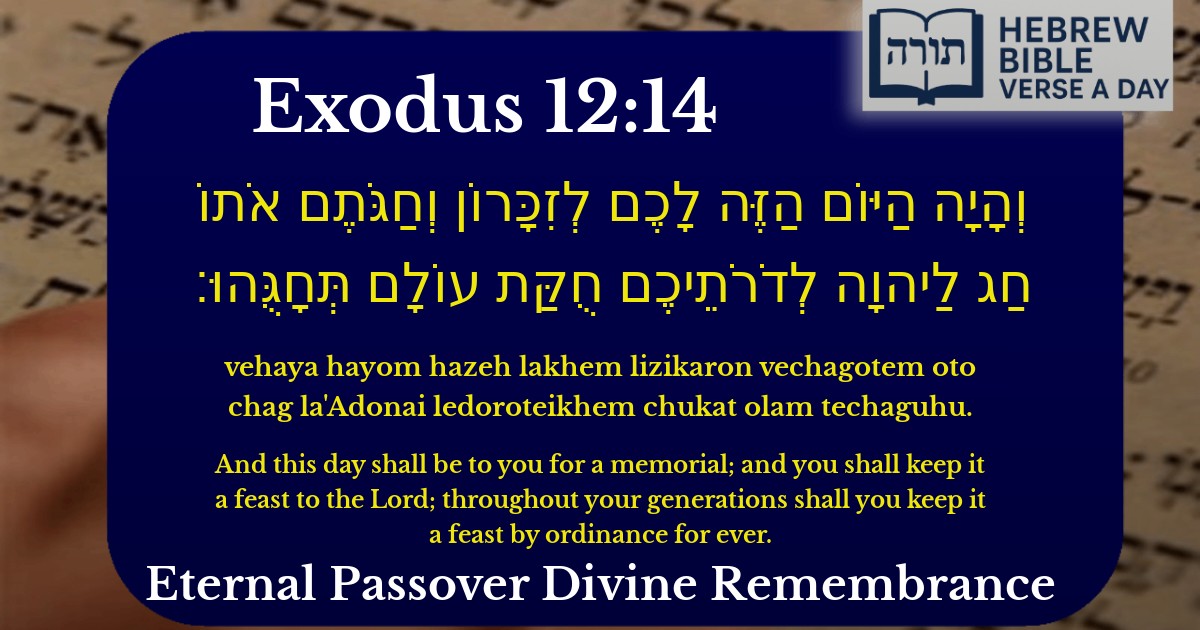Join Our Newsletter To Be Informed When New Videos Are Posted
Join the thousands of fellow Studends who rely on our videos to learn how to read the bible in Hebrew for free!
Hebrew Text
וְהָיָה הַיּוֹם הַזֶּה לָכֶם לְזִכָּרוֹן וְחַגֹּתֶם אֹתוֹ חַג לַיהוָה לְדֹרֹתֵיכֶם חֻקַּת עוֹלָם תְּחָגֻּהוּ׃
English Translation
And this day shall be to you for a memorial; and you shall keep it a feast to the Lord; throughout your generations shall you keep it a feast by ordinance for ever.
Transliteration
Vehaya hayom hazeh lakhem lizikaron vechagotem oto chag la'Adonai ledoroteikhem chukat olam techaguhu.
Hebrew Leining Text
וְהָיָה֩ הַיּ֨וֹם הַזֶּ֤ה לָכֶם֙ לְזִכָּר֔וֹן וְחַגֹּתֶ֥ם אֹת֖וֹ חַ֣ג לַֽיהֹוָ֑ה לְדֹרֹ֣תֵיכֶ֔ם חֻקַּ֥ת עוֹלָ֖ם תְּחׇגֻּֽהוּ׃
וְהָיָה֩ הַיּ֨וֹם הַזֶּ֤ה לָכֶם֙ לְזִכָּר֔וֹן וְחַגֹּתֶ֥ם אֹת֖וֹ חַ֣ג לַֽיהֹוָ֑ה לְדֹרֹ֣תֵיכֶ֔ם חֻקַּ֥ת עוֹלָ֖ם תְּחׇגֻּֽהוּ׃
🎵 Listen to leining
Parasha Commentary
📚 Talmud Citations
This verse is quoted in the Talmud.
📖 Megillah 20b
The verse is referenced in the discussion about the timing of the reading of the Megillah and the observance of Purim, drawing a parallel between the perpetual observance of Passover and the commandment to remember the day of Purim.
📖 Pesachim 96b
The verse is cited in the context of discussing the perpetual nature of the Passover observance, emphasizing its importance as a memorial throughout generations.


Context in the Torah
The verse appears in Shemot (Exodus) 12:14, following the commandments regarding the Korban Pesach (Paschal sacrifice) and the Exodus from Egypt. It establishes Pesach as a perpetual holiday for all generations.
Rashi's Explanation
Rashi comments that "לְזִכָּרוֹן" ("for a memorial") refers to remembering the miracles of the Exodus. He emphasizes that this day should be observed as a chag (festival) through specific mitzvot, including the prohibition of chametz and the eating of matzah. The phrase "חֻקַּת עוֹלָם" ("an ordinance forever") underscores that this commandment is binding for all time.
Rambam's Perspective
In Mishneh Torah (Hilchot Chametz U'Matzah 7:1), Rambam elaborates that the obligation to celebrate Pesach applies in all generations, even when the Beit HaMikdash is not standing. The mitzvah includes retelling the story of Yetziat Mitzrayim (the Exodus) and performing the symbolic acts commanded in the Torah.
Midrashic Insights
Halachic Implications
The Shulchan Aruch (Orach Chaim 429) rules that the mitzvah of remembering the Exodus applies every day (as in Kriyat Shema), but the observance of Pesach as a festival is unique in its detailed rituals, such as the Seder and the prohibition of chametz. The phrase "חֻקַּת עוֹלָם" reinforces that these laws are immutable.